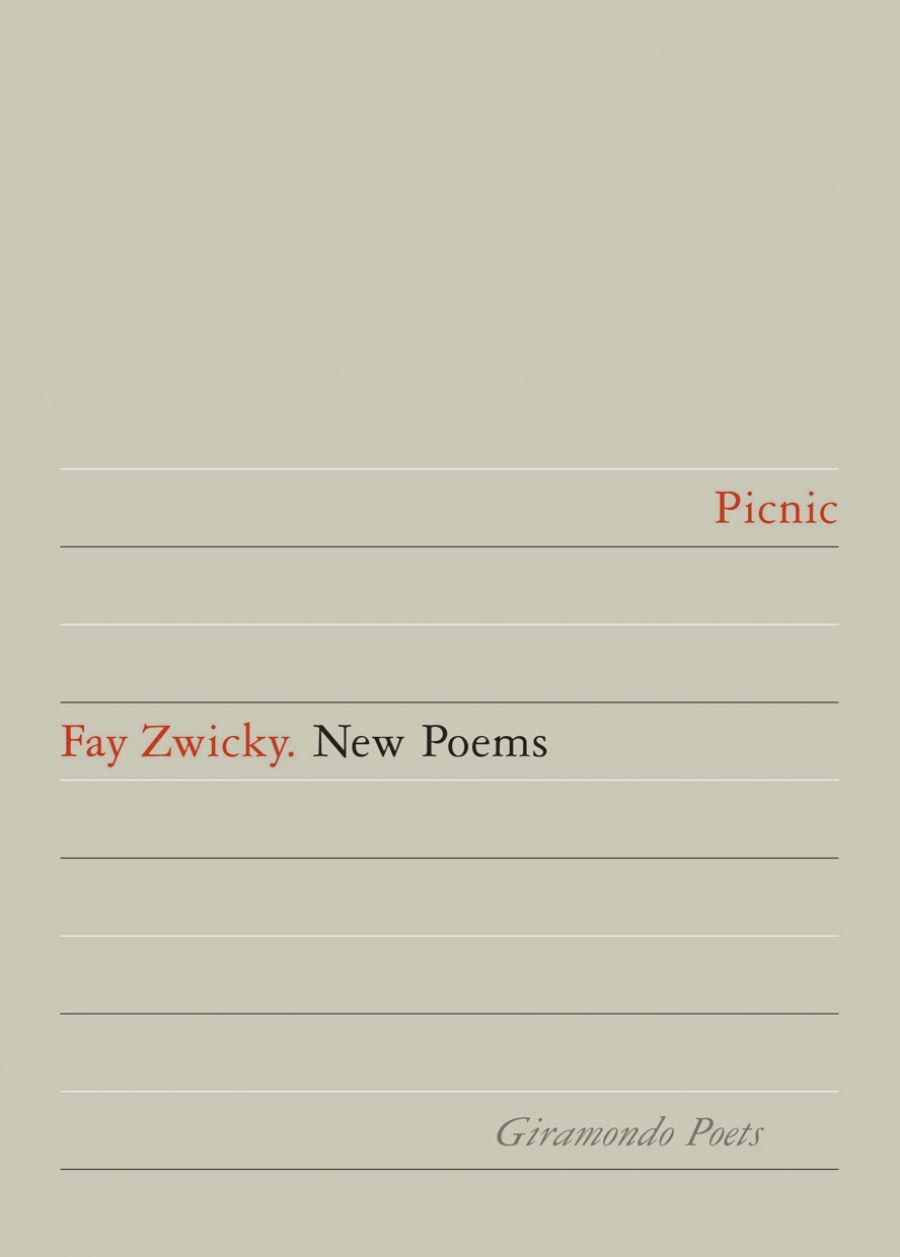
- Free Article: No
- Contents Category: Poetry
- Review Article: Yes
- Online Only: No
- Custom Highlight Text:
Picnic is probably Fay Zwicky’s most confident collection. In it she renounces certain kinds of brilliance for a freer and more open style of poetry – what she calls in one poem ‘the grace of candour’. It is a style that approximates moral qualities: honesty, direct ness, kindness to strangers. And it is in fact such moral qualities that give force to this collection
- Book 1 Title: Picnic
- Book 1 Biblio: Giramondo, $22 pb, 80 pp
Watching all this, in and out of it,
remembering my own young wifehood
as a stranger, my first child born
in an alien tongue, the grey apartment block,
the cold, the speechless folk who passed
without a nod or smile, the men who carried
boxes piled with lurid neckties
from the Kravatenfabriek upstairs.
A condemned building.
Where would we all end up?
This stanza starts like an argument, which turns into a description, which opens into a memory and leads to a question. As such, it works like a small exercise in compassion.
The poem keeps its conversational ease. Zwicky’s sentences run easily over line breaks, through clauses and incidental details. The phrase ‘alien tongue’ calls to mind Keats’s strange, beautiful lines in ‘Ode to a Nightingale’: ‘Perhaps the self-same song that found a path / Through the sad heart of Ruth, when, sick for home, / She stood in tears among the alien corn …’ But Zwicky makes the reference so unemphatically it becomes part of the poem’s emotional register. This is a political poem written in a lyrical style and it suggests in this way the inwardness of politics.
Zwicky’s first collection, Isaac Babel’s Fiddle (1975), shows the influence of Gwen Harwood. Like Harwood, Zwicky was a gifted pianist. Her first collection has a formal, musical style and a habit of holding autobiography in a philosophical frame of reference; creating a confessional poetry characterised by cool intelligence. But Zwicky’s latest collection is remarkably different, in tone as well as style. Her easy comment, ‘I joined a picnic’, sums up the difference: her poetry’s frame of reference now seems to be community, not philosophy.
The other outstanding poems in this collection also run over several pages. They achieve their effect through the accumulation of anecdotes, memories and different points of view. In this way, they keep the sense of doubting, varied experience that insights, for instance, leave behind. There are poems about children, ageing and travel, alongside poems about Aceh and Tiananmen Square, all written in Zwicky’s quizzical, spare, intelligent version of free speech.
‘The Terracotta Army at Xi’an’ forms the heart of this collection. It is a series of dramatic monologues. In form, it is something like the second part of W.H. Auden’s commentary on The Tempest: ‘The Sea and the Mirror’. In Zwicky’s poem, the Emperor Qinshihuang, the Spear Bearer, the Cook, the Farrier, the Archer and the Potter who is forging these terracotta soldiers speak in turn of their role in this true theatre of power: lives in thrall to the emperor’s posterity. The terracotta army serves as an image, therefore, of what power now and then makes of people: ‘biddable, landlocked, willing subjects’ with secret dreams.
Zwicky creates a setting that gives her conversational style a kind of resonance that conversations typically achieve only in retrospect. ‘The Terracotta Army at Xi’an’ is remarkable for the aching sense of life it brings to these bare, factual monologues. The characters reflect on all they will lose with a longing for the present that works like nostalgia, leaving no gap between events and their fullest meanings.
This collection is characterised by restrained, deliberately unspectacular writing, arranged so thoughtfully that it achieves an effect hard to locate in any particular image or phrase. In this respect, Picnic is far from Zwicky’s extra ordinary second collection, Kaddish and Other Poems (1982), a collection full of rage and broken rhetoric. Its title poem, ‘Kaddish’, is a lament for Zwicky’s father, drowned at sea, and it works like a storm of language: psalms, lists, chants and questions. Like Allen Ginsberg’s 1958 poem of the same name, it is ‘Proem, narrative, hymmnn, lament, litany & fugue’. Like Ginsberg, Zwicky uses the oldest, most familiar and impersonal poetic language to make something public out of lonely grief and rage.
Reading an essay on Radio National’s Lingua Franca (9 September 2006), Zwicky reflected on what you might call the political implications of poetic style: ‘As a student in the 1950s, I was very susceptible to mercurial language and its more hypnotic practitioners …’ She explains that the discovery of W.B. Yeats’s unlikeable opinions startled her into a preference for poetry that was ‘honest, personal, direct and passionate’. This just about describes Zwicky’s poetic style, though if you wanted to catch a sense of its sceptical and provisional character, you might prefer the Potter’s account of his art in ‘The Terracotta Army at Xi’an’: ‘I drew to find out what it was I saw.’


Comments powered by CComment